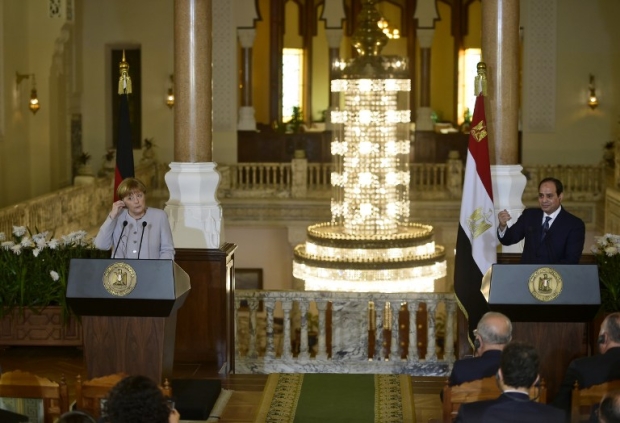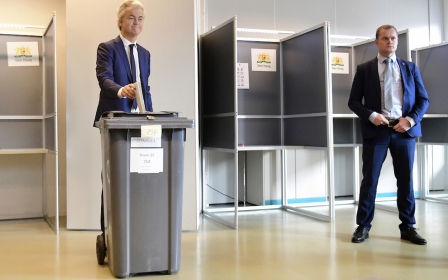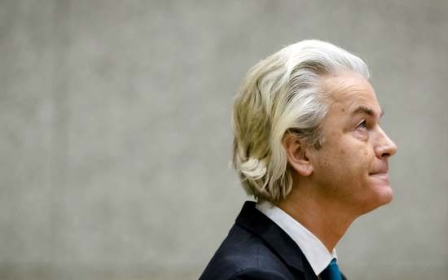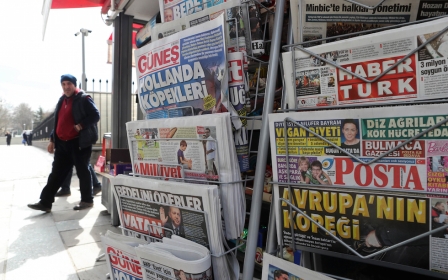Why some European states have declared war against Turkish ally
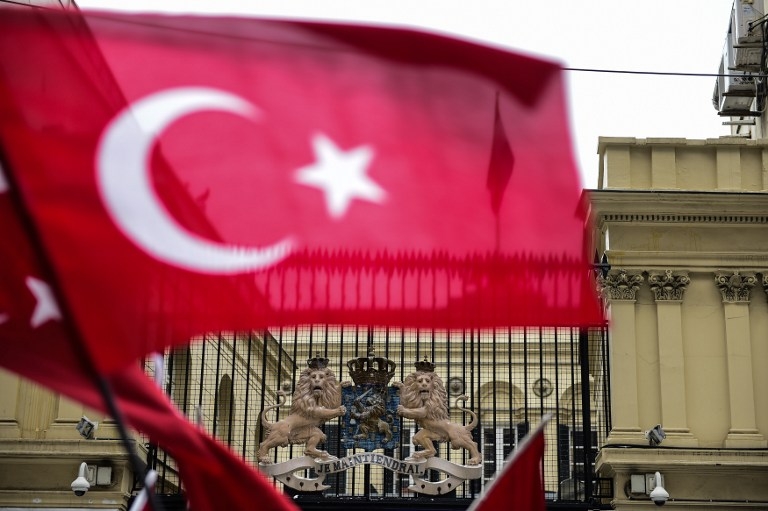
In preparation for the 16 April referendum, Turkish ministers planned to meet their citizens in Germany to campaign for the crucial constitutional amendments
Instead, Germany decided to ban these election gatherings, an unprecedented measure that compelled both the foreign and family affairs ministers to hold much smaller meetings with their citizens inside the Turkish consulate.
There is nothing to warrant concern by any of the European states whether Turkey is governed by a presidential system or a parliamentary one
What is surprising is that, on the whole, Berlin’s relations with Ankara are not bad. The German chancellor met the Turkish president only a few weeks ago when she visited Ankara.
Realising the enormity of its decision, the federal government in Berlin tried to blame the decision to cancel the Turkish gatherings on the local authorities, releasing statements that were inconsistent with those of the authorities about who bore responsibility for the decision. Meanwhile, a German TV channel belonging to the ARD public network broadcast segments urging Turkish citizens to vote “no” to the constitutional amendments.
The Netherlands, a European power unconcerned about the reactions its policies will bring, took it even further than Germany.
Cancellations and protests
On 10 March, just hours before the arrival of Turkish Foreign MInister Mevlut Cavusoglu, who was scheduled to meet Turkish citizens living in the Netherlands, Dutch authorities issued a decision cancelling his plane's landing permission.
The following day, the Turkish minister of family affairs, who was on a visit to Germany at the time, crossed the borders into the Netherlands, hoping to meet the Turkish community inside her country’s consulate in Rotterdam. Instead, Dutch police surrounded the consulate, arrested the minister, declared her persona non-grata, prevented Turkey's consul general in Rotterdam from meeting with her and deported her as though she was a criminal.
What is astonishing here too is that the Dutch government seemed surprised at the angry Turkish reactions. When Turkey’s president described the Dutch conduct as fascist and a remnant of Nazism, the Dutch prime minister went mad.
That same day, police officers violently attacked Turkish citizens who assembled in front of their country’s consulate to protest against the minister's deportation.
Two days later, Denmark announced that it was postponing an official visit that the Turkish prime minister was scheduled to make.
Behind Europe's 'concern'
More than six million Turks live in Europe, many who continue to keep their original nationality - and since Turkey endorsed the right of expatriates to vote, Turkish political parties have been focused on rallying support among these voters. In Germany alone, there are an estimated 1.5 million Turks who have the right to vote.
Europe's confrontation with Turkey's ruling party could be seen as nothing more than an expression of concern for the future of Turkish democracy. But this is not a convincing answer.
The government’s ministers were not alone in planning to attend election rallies in Germany and the Netherlands. Deniz Baykal, former head of the opposition Republican People’s Party (CHP) was also scheduled to address his party’s supporters in Germany.
How can you explain this European hysteria towards ordinary campaigning activities conducted by a supposed ally and candidate for European Union membership?
The quickest answer goes as follows: Europe is unhappy about the Turkish government's proposed constitutional amendments because it believes such amendments will make Turkey less democratic.
In other words, Europe's confrontation with Turkey's ruling party is nothing more than an expression of concern for the future of Turkish democracy.
But this is certainly not a convincing answer. Undoubtedly, there is a major debate about the Turkish constitutional amendments. Turkish voters seem to be divided regarding what it would mean to change the system of governance in the country from a parliamentary system to a presidential one.
Transparent campaign
Until the eruption of the crisis over campaigning activities between Turkey and Europe, there was nothing to indicate the existence of a decisive majority in favour of endorsing these amendments.
What is definite is that the referendum campaigns inside Turkey have been democratic and transparent.
But what is definite is that the referendum campaigns inside Turkey have been democratic and transparent.
Supporters of the amendments, include the Justice and Development Party (AKP) and the Nationalist Movement Party (MHP), are holding mass rallies across the country. Similarly, CHP launched a widespread campaign opposing the government and the amendments proposed.
Turkish media on the whole has been fully engaged in the campaign, publishing and airing debates taking place on the impact the constitutional amendments will have on the country’s future.
And Turkey, of course, is not the first country to adopt a presidential system. There is nothing to warrant concern by any of the European states, or the Western countries allied with Turkey, whether Turkey is governed by a presidential system or a parliamentary one.
European delusions
If some German or Dutch politicians believe that confrontation with the Turkish government will help the “No” camp, they are deluded.
The Netherlands permitted the Peoples’ Democratic Party (HDP) to organise election rallies to express opposition to the constitutional amendments on 2, 3 and 4 March. The Turks are no less proud about the dignity of their country and state than any other nation with a nationalist heritage.
It is well-known that the Turkish government is counting on three main blocs in its bid to win the referendum: the Islamists, the conservatives and the nationalists. Until a few weeks ago, the nationalist street was the most divided about the amendments. But now, it is possible to expect that the majority of the nationalist voters will most likely support the amendments.
In fact, Europe’s behaviour angered Turks from across the spectrum. The opposition CHP party called off a political rally planned in Germany, and its leader demanded that the government should sever ties with the Netherlands. Turkish business and industrial associations, with completely different backgrounds, have condemned the inappropriate Dutch attitude towards the two Turkish ministers.
But why take the European democratic discourse seriously? German Chancellor Merkel was the first to receive the Egyptian coup president, and made an official visit to Cairo a few weeks ago. Merkel’s visit comes while she knows that tens of thousands of political detainees are being held inside the prisons of Sisi’s regime, one that embarks on a daily campaign of assassinations against young dissidents.
Why take the European democratic discourse seriously? German Chancellor Merkel was the first to receive the Egyptian coup president, and made an official visit to Cairo a few weeks ago
This has been the exact same stance of the head of the Dutch government who met with Sisi last September. Neither Germany, nor the Netherlands, nor any other European state for that matter, have taken serious and convincing action to protect the calls for democracy and freedom in the Arab world.
Other explanations
As for the hesitant and belated responses of the European governments towards the failed military coup attempt in Turkey last summer, they certainly did not reveal the existence of any regard for Turkish democracy.
The other explanation for the European response points to an apprehension of those in power toward the persistent rise of the populist right-wing parties that are hostile to Islam and to immigrants, especially in light of the recent elections in the Netherlands and the elections that are expected to take place in Germany later this year.
This, of course, is a more convincing explanation. Yet, it is also not sufficient. No matter how short-sighted political parties in Germany and the Netherlands have been, it is obvious that creating unjustifiable crises about the immigrant communities in Europe will only serve racist currents and parties.
The brutal response of the Dutch police to Turkish protesters suggests that protesters now pose an existential threat to the security and stability of the Netherlands. Such a climate will only serve the supporters of Geert Wilders and his like, and is a foolish move by Dutch and German authorities.
Yet there may be more to this. There is an increasing amount of animosity toward Turkey and what it represents, with attempts being made to undermine its influence, irrespective of who holds the reins of power in Ankara.
- Basheer Nafi is a senior research fellow at the Al Jazeera Centre for Studies.
The views expressed in this article belong to the author and do not necessarily reflect the editorial policy of Middle East Eye.
Photo: A Turkish flag waves in front of the Dutch Consulate in Istanbul on 12 March 2017 (AFP)
This article is available in French on Middle East Eye French edition.
New MEE newsletter: Jerusalem Dispatch
Sign up to get the latest insights and analysis on Israel-Palestine, alongside Turkey Unpacked and other MEE newsletters
Middle East Eye delivers independent and unrivalled coverage and analysis of the Middle East, North Africa and beyond. To learn more about republishing this content and the associated fees, please fill out this form. More about MEE can be found here.




